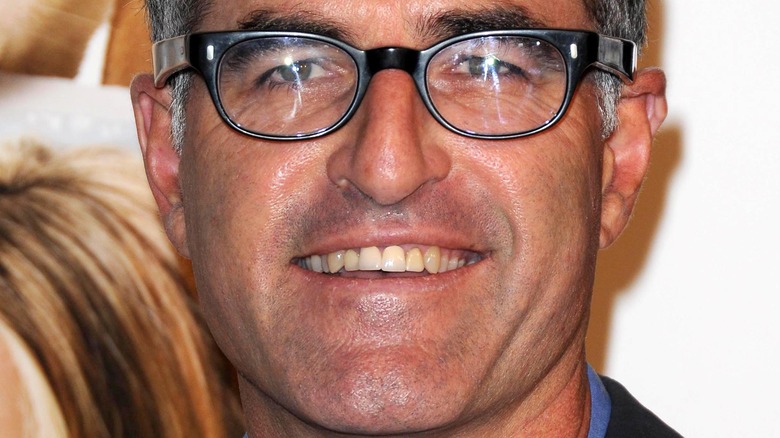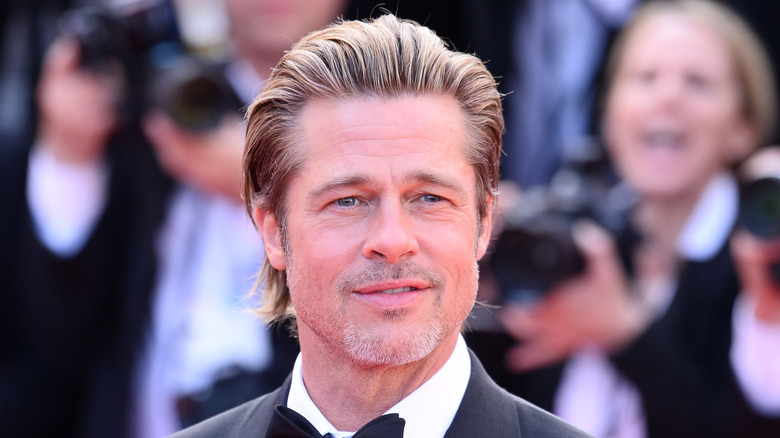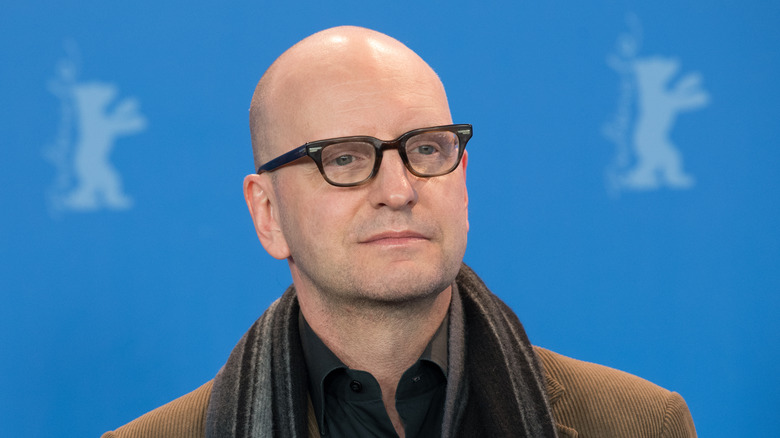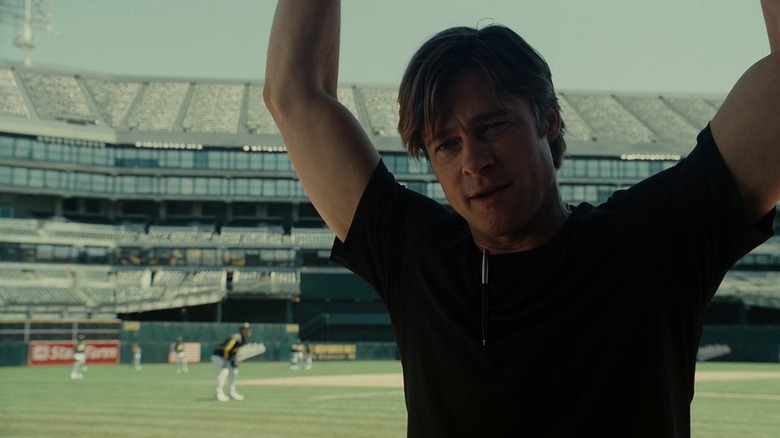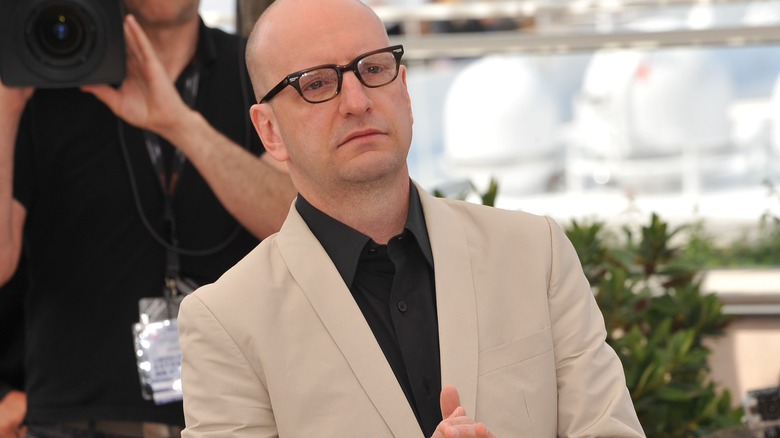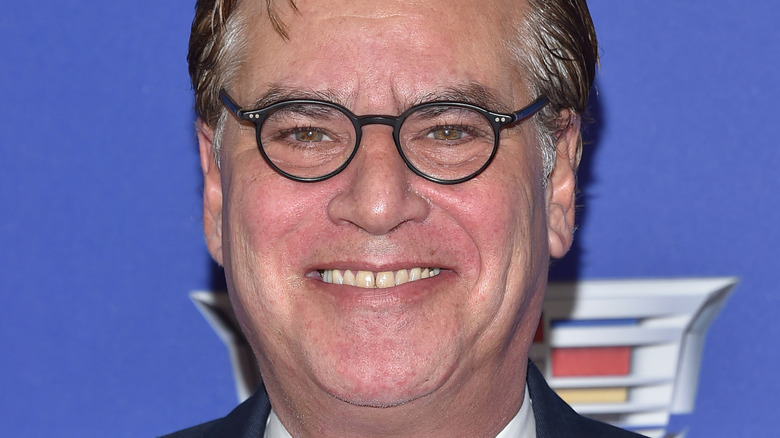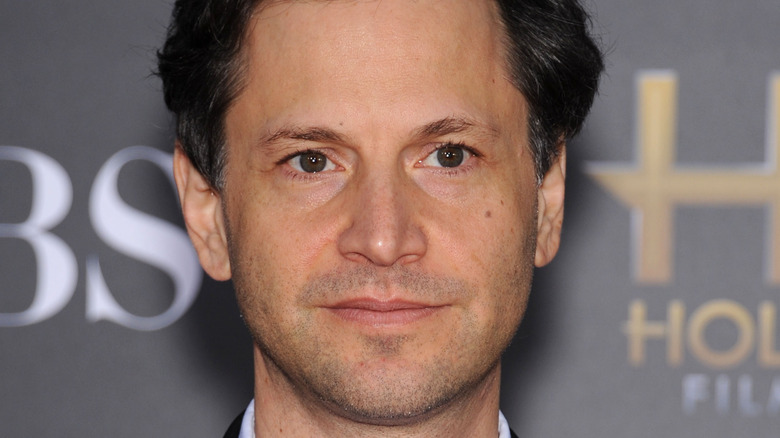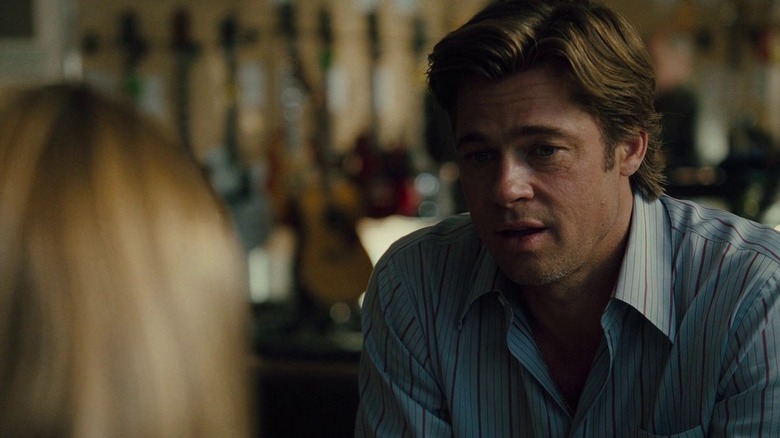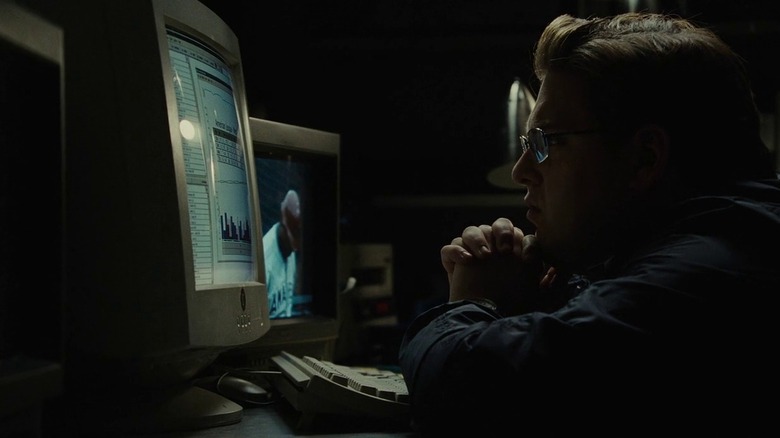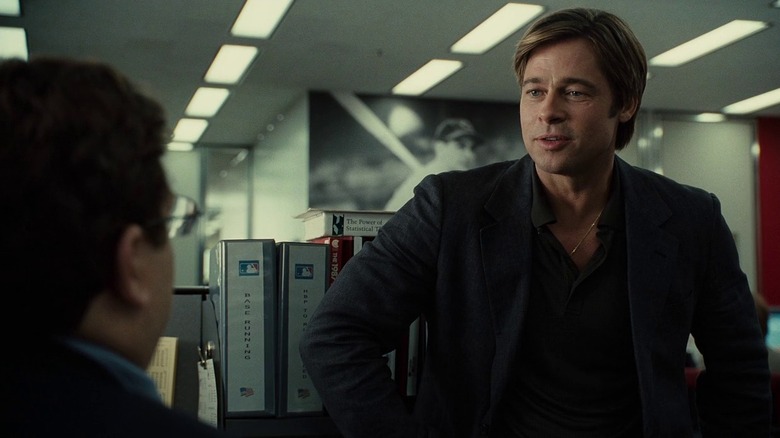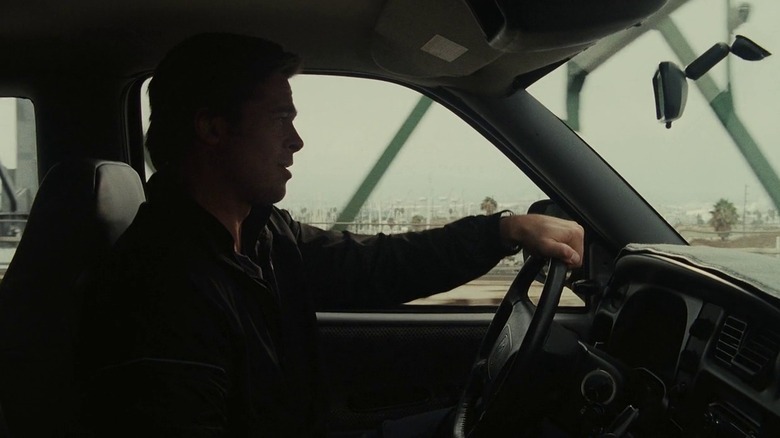The Untold Truth Of Moneyball
Released to movie theaters in September 2011, "Moneyball" isn't your typical sports movie. It isn't entirely about the players on the field, but rather a manager by the name of Billy Beane. Chronicling his insistence on using a new process that relied on numbers to assemble a winning baseball team, "Moneyball" is still a classic underdog sports movie that can prove captivating to viewers of all stripes rather than just baseball devotees. Among the many highly positive reviews the production scored, Rafer Guzman of Newsday summarized the unique charms of "Moneyball" by observing how "the film reveals deep affection for America's pastime while also acknowledging its cold, bottom-line realities. That's not the shower-of-sparks magic you normally see in a baseball movie, but a magic all its own."
While all the praise may have ensured that "Moneyball" is an acclaimed entry in the modern pantheon of sports movie titles, there are still plenty of aspects of this movie that aren't as well-known by the general public. These include its chaotic production, which entailed losing multiple directors and constantly scraping together a workable budget for the project. To dig into the untold truth of "Moneyball" is to comprehend the impossible journey it took to get to the silver screen and further appreciate that this movie even exists.
David Frankel was originally set to direct
For film aficionados, "Moneyball" is tied to two filmmakers: Steven Soderbergh and Bennett Miller. The former got famously close to actually filming "Moneyball" before his vision for the project was rebuked by Sony executives, while Miller was the director who helmed the final cut of "Moneyball." However, another director was tied to "Moneyball" in its earliest days, though he's not as famous as multiple Best Director Oscar nominees Soderbergh or Miller.
In October 2008, Variety first broke the news of "Moneyball" becoming a movie, with "The Devil Wears Prada" director David Frankel attached to direct. Though not an obvious choice for this production, Frankel was in high demand as a filmmaker thanks to "Prada" becoming such a massive box office success in 2006. Frankel would eventually leave "Moneyball" for unknown reasons, though Entertainment Weekly would later report that star Brad Pitt was behind the departure, which happened shortly after the premiere of Frankel's December 2008 movie "Marley & Me." With Frankel out of the picture, this would pave the way for subsequent directors Soderbergh and Miller to spend time bringing this production out of the dugout and onto the field.
Why Brad Pitt was drawn to Moneyball
Through the endless production problems of "Moneyball," one constant fixture of the endeavor was Brad Pitt. Even as directors came and went, Pitt stayed on as the lead actor tasked with portraying baseball manager Billy Beane. There's a reason Pitt endured in the face of all of these challenges, and that simply came down to his own deep affection for the story "Moneyball" was chronicling.
"I first picked up the book by Michael Lewis and was taken with these guys who out of necessity had to challenge conventional wisdom of their industry," Pitt told NPR. "We deal with the Oakland A's in 2002, and they are a team who had a payroll of $38 million to platoon a team, and they're playing against teams that have $120 million with another $100 million in reserves. And there is — there was no way to have an equal fight. And so what these guys had to do was re-question baseball, baseball knowledge. They had to take everything apart and start over again." Speaking with CBS News, Pitt also noted his affection for "Moneyball" was because it "was a story of an obsessive character and I was obsessive about getting it to the screen. It was this idea of value and our self worth and how it is often tabulated by a failure."
Steven Soderbergh's original vision for Moneyball
When Steven Soderbergh first signed on to direct "Moneyball," he didn't just see it as a chance to reunite with "Ocean's Eleven" actor Brad Pitt. He also saw a chance to pursue ideas he found fascinating. "I like the idea of someone who is willing to behave in a way that proper society views as transgressive and then parlays that into access," Soderbergh told Suicide Girls while referring to "Moneyball" lead Billy Beane. "I think that's a really interesting idea, and why shouldn't they? If that's their only way in and that's important to them — and I'm not saying it should be — but if that's important to them and that's their way in, then great ... there is a sort of renegade ethos in play."
While also noting that he found the concept of how money impacts people intriguing as well, Soderbergh also explained that he had concrete notions of how to turn the subject matter of "Moneyball" into riveting cinema. "I think we have a way in, making it visual and making it funny," Soderbergh explained. "I want it to be really funny and entertaining, and I want you to not realize how much information is being thrown at you because you're having fun. We've found a couple of ideas on how to ... [make] all that information to reach you in a way that's a little oblique." With these themes and visual ideas laid out, Soderbergh sounded ready to swing for the fences with "Moneyball."
The sudden demise of Soderbergh's Moneyball
Many unmade movies are axed long before they get close to starting principal photography, but some unfortunate features get so close to getting made that it seems like a cruel trick. If they were just inches away from getting off the ground, why not just let these poor movies start filming? Such a tragic fate befell Steven Soderbergh's take on "Moneyball," which had locations, a script, and lead actors Brad Pitt and Demetri Martin all ready to go only for Sony/Columbia Pictures to pull the plug just days before shooting would have started.
The Guardian reported that this drastic move was made due to Soderbergh doing a final polish of the script that led studio executives to dub this iteration of "Moneyball" as too "arty" for its mid-budget price tag. With Soderbergh refusing to make the film more "mainstream," Sony called "Moneyball" off. While the studio allowed the producers of "Moneyball" to try and revive the feature elsewhere, it was confirmed that the likes of Warner Bros. and Paramount Pictures had all passed on bringing "Moneyball" back from extinction. Like the mood of any inspirational sports movie at the end of its second act, the production of "Moneyball" seemed to be hopeless.
Soderbergh's perspective on losing Moneyball
It can't be a pleasant experience losing a directorial gig, especially when one gets so close to actually bringing it to life. So it was with Steven Soderbergh, who came so close to helming "Moneyball" before fate intervened. In the immediate wake of this loss, Soderbergh remained mum on how he really felt about striking out in trying to bring "Moneyball" to life. However, two months after the project fell apart, Soderbergh finally opened up.
"There have been a couple of times in my career where I've been unceremoniously removed from projects," Soderbergh told the Orlando Sentinel (per SlashFilm). "I don't waste a lot of energy on it. It doesn't get you anywhere. As soon as it became clear that there was no iteration of that movie that I was going to get to direct, I immediately started looking around for something else to do." Soderbergh has otherwise remained quiet about "Moneyball," instead focusing on a variety of other projects, including his 2019 film "High Flying Bird" — another drama about the behind-the-scenes world of sports management that shared lots of similar thematic elements with "Moneyball."
The arrival of Sorkin and Miller
With "Moneyball" no longer a Steven Soderbergh film, the project needed new creative management. It wasn't long before Sony turned to a key creative artist involved in "The Social Network," a then-recent and highly acclaimed drama for the studio. "I was hired for three weeks and then again for another three weeks, and that turned into a year and a half," recalled "Network" screenwriter Aaron Sorkin to The Hollywood Reporter. "I wanted Brad to do most of the talking. He'd speak generally about his love of character-driven movies from the '70s."
As for how Bennett Miller got attached to the project, that was thanks to an actor who wasn't on the "Moneyball" call sheet. "My dear friend Catherine Keener said, 'You've got to talk to Bennett Miller,'" Brad Pitt said. With Keener's recommendation, a call went out to Miller. "I got a call ... asking if I was interested in baseball," Miller noted. "I said I used to be. He said, 'If you're interested in taking a look at this thing, Brad would be interested in talking to you about it.'" After some coercing, Miller signed on to helm "Moneyball." A movie that previously had no behind-the-scenes talent now had some significant directorial and screenwriting prowess on its side.
Miller's vision for Moneyball
Though he wasn't the first director to be attached to "Moneyball," Bennett Miller came aboard the movie prepared to not just rehash what prior filmmakers had considered doing with this true story. Unsurprisingly for the director behind challenging arthouse fare like "Capote" or "Foxcatcher," Miller — inspired by the words of Brad Pitt — had hopes of smuggling something thought-provoking into an appealing package.
"I wasn't interested in making a sports movie, just recycling tropes and convention," said Miller to The Hollywood Reporter. "Then I'd just be a gun for hire, working for the studio. But the question was, How do you avoid that? Brad said it will be a Trojan horse. We will give them the gift of a Hollywood movie starring Brad Pitt that's going to be real entertainment, but inside it is some cargo that is not really accepted in a vintage way, something that they don't anticipate." In talking to CinemaBlend, Miller elaborated, "A guy trying to put together a baseball team that's going to win on a low budget, it's a nice structure and it's the stuff that you can make a movie about ... [but] what it's all about ... is a guy who's trying to remedy something from his past, that he has his own personal, private reasons that are driving him and make him desperate to accomplish something." This creative vision got Miller out on the field and ready to direct "Moneyball."
How Chris Pratt got cast in Moneyball
Before he was headlining Marvel and "Jurassic World" movies, Chris Pratt's biggest film role was portraying Scott Hatteberg in "Moneyball." Initially, though, Pratt was deemed ill-suited for the role by the project's producers, solely based on his physical appearance rather than his acting skills.
"My agent called me and said, 'Chris, they really thought you were good, but they think you're too fat,'" Pratt recalled to MovieLine via The Huffington Post. "I was like, 'F***, really? That sucks. OK, well, I can lose weight. Did you tell them I could lose weight?' 'Yeah, we told them. They haven't offered it to anyone else. There's no guarantee, but...' It was another three months before I found out I got the role, but in that three months I think I dropped 30 pounds. I was bound and determined to become Scott Hatteberg whether they cast me or not." Going that route, Pratt not only secured the role of Hatteberg but he also defined the physique he'd use in his later action blockbuster movie roles.
As for other physical-based challenges Pratt faced in doing the part, there was also just looking like a convincing baseball player. "I think the hardest thing was the mechanics of the baseball swing, and doing it left-handed versus right-handed," Pratt explained to AZ Snake Pit. "It was all difficult physically, but it was just so fun that it didn't seem that hard."
How the budget for Moneyball became manageable
The production of "Moneyball" was so full of challenges that the issues continued until right before shooting commenced. Some of the final problems that had to be ironed out revolved around the film's budget, which Sony wanted to keep from spiraling out of control. Just weeks before principal photography was set to begin, Deadline reported that Sony was ready to commit to "Moneyball" now that the budget had been slimmed down from $60 million to $47 million.
Reportedly, this was accomplished partially through script rewrites by Aaron Sorkin but was mainly achieved through everyone involved getting paid noticeably less than usual. This included star Brad Pitt, who was originally set to make $15 million from "Moneyball." Though a new salary was not disclosed at the time, it was noted that Pitt reducing his fee was critical to getting "Moneyball" down to a reasonable price tag. With these budgetary concerns ironed out, "Moneyball," after going through multiple directors and nearly wiping out entirely, was ready to get in front of the cameras.
Jonah Hill's takeaways from doing Moneyball
"Moneyball" was a significant movie for many of its participants, but it was especially important for Jonah Hill. His first foray into dramatic acting, "Moneyball" shifted the trajectory of his career and set the stage for Hill to not only act in other heavier fare but even direct dramas like "Mid-90s." Not surprisingly, Hill managed to walk away from "Moneyball" with some significant takeaways that influenced his subsequent career moves.
""I learned a tremendous amount from Brad, not specifically about acting on 'Moneyball,' but by watching him produce and watching his commitment to this movie throughout so many incarnations, and just his advice about making interesting choices as an actor. That's really been the most inspiring thing Brad's done for me, besides allowing me to play this part," Hill said to The Hollywood Reporter in September 2011. "All the movie lessons I learned are really life lessons that you can put to anything even if they are scary to people." Hearing about the lessons he took from Pitt, it's apparent that, even when it was initially released, Hill realized that "Moneyball" was going to be an impactful moment in his career.
Miller's hesitancy before first screening Moneyball
It must be a daunting experience screening a movie you directed for the first time. To make a piece of art is to put a piece of yourself out into the world and a feature film is no different. To screen such a project is to put not only the movie on display for judgment but also yourself. "Moneyball" director Bennett Miller was well aware of those expectations when he first screened the film for Sony/Columbia Pictures executives, though it turned out he had no reason to be scared.
""There was such a great feeling when the lights came up and everyone felt we had done the right thing," producer Michael De Luca told The Hollywood Reporter about the immediate response when the first "Moneyball" screening was done. "This was a movie that deserved its day in court." He wasn't the only one who felt good about what "Moneyball" had become. "It was very emotional," confirmed producer Rachael Horovitz. "I remember Amy Pascal and I both being teary-eyed when we saw the director's cut." Though Miller entered that fateful screening nervous, the overall quality of "Moneyball" was already apparent from this early stage.
Moneyball at the box office
Not surprisingly, "Moneyball" didn't exactly hit a home run at the box office. After all, this was a talky movie for grown-ups about the math behind assembling the ultimate underdog baseball team. Was this really going to appeal to the general public as a must-see movie in theaters? Thankfully for those who financed the film, "Moneyball" actually turned into a solid moneymaker and a notable reinforcement of how Brad Pitt's star power could help a project that didn't necessarily have "hit" stamped on it.
Opening to $19.5 million domestically, "Moneyball" was a decent performer but not an exceptional one. Notably, the ensuing word-of-mouth that this project generated was enough to ensure that it never dipped more than 40% from weekend to weekend for the first month of its release. Eventually, "Moneyball" managed to hit a $75.6 million North American total while it grossed another $35.6 million internationally for $111.2 million global total, more than double its $50 million budget. "Moneyball" was no challenger to the biggest blockbusters of 2011, but as an autumn drama aimed at adults, "Moneyball" left everything it could out on the field.

